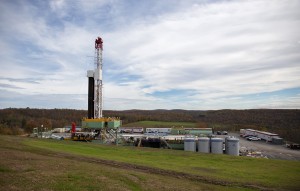New study will examine impact of shale boom on families
-
Katie Colaneri
Here’s the question that’s been nagging Penn State University researcher Molly Martin for years: When it comes to a child’s success, how much does money matter?
Martin says that’s been a tough one for sociologists like her to answer. That is, until the Marcellus Shale boom.
“It’s very rare that you can separate the money from everything else about the person,” she said, noting income may or may not be related to a parent’s other traits that impact their child’s health or their performance in school, for example.
Martin is leading a new study that will compare families in New York State where there is a moratorium, despite known shale deposits, with families in Pennsylvania – which is producing record-breaking amounts of gas. This key difference in neighboring states offers a unique look at the impact money may have on children’s lives.
“In this case, we have something about… geological processes that happened 300 million years ago that has a way in which it’s going to effect your income and that’s completely outside of your control,” said Martin. “Those pipelines are outside your control, as well as the state policy.”
Researchers will use government data to compare birth outcomes, crime, teen birth rates, as well as school attendance and performance. They will also examine how these factors may change within Pennsylvania where the shale boom has not effected all families living on the Marcellus equally.
For instance, some landowners with gas leases have received royalty payments of varying amounts, while others who do not own property or where drilling hasn’t begun have gotten nothing.
“We’ll account for this change over time and across space, but particularly paying attention to differences in infrastructure,” Martin said.
The first results of the study could be available as soon as the spring.

















